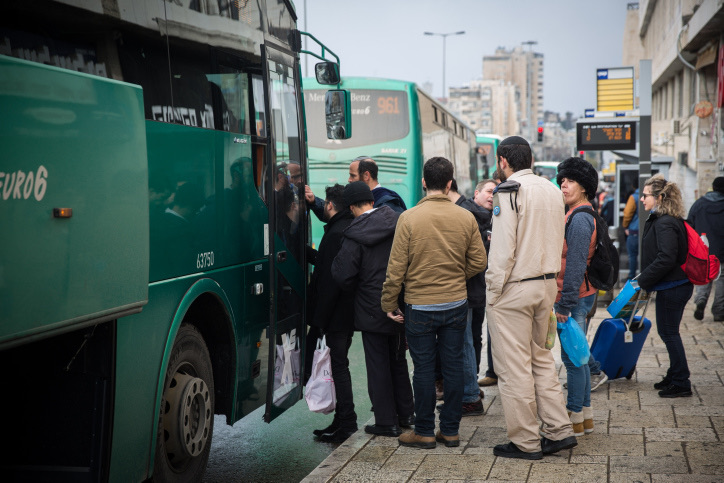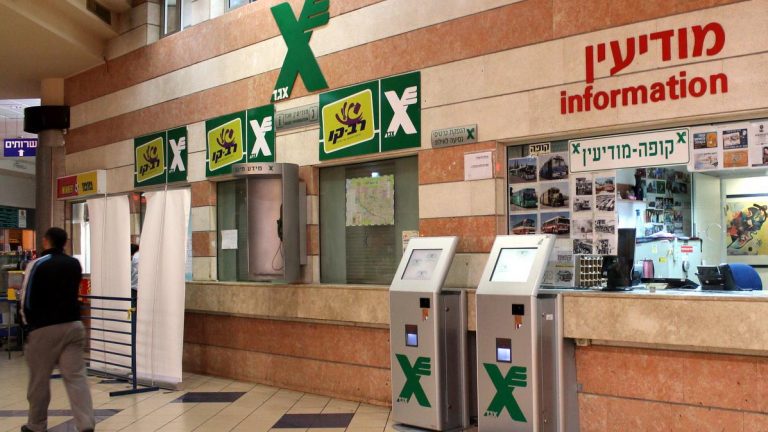
Earlier this month, the Ministry of Transportation presented a new reform called Transport Justice, which is meant to decrease the cost of public transportation for various populations of Israeils. According to the announcement, which was presented by Minister of Transportation Miri Regev at the offices of Israel Railways in Lod, the new discounts will apply to over 2.8 million Israelis, saving them hundreds of millions of shekels.
The reform includes free travel benefits on public transit for a full year for those finishing their national service and discharged soldiers and a 50% discount to residents of the country’s geographic periphery, as well as discounts to adults aged 26 and under, those with disabilities, and those who receive social security benefits.
The greatest effect of the reform applies to the residents of the periphery, who will from now on pay only 50% of the price for a monthly public transport pass. The ministry determined which areas would be eligible for the discount based on the Central Bureau of Statistics’ periphery index, which ranks areas according to their distance from the center of the country and large employment centers. The discount will not apply to areas in the geographic periphery that have high socio-economic statuses.
Adults aged 18 to 26 will be entitled to a 33% discount on all kinds of monthly passes and on the purchase of “accumulated value”—in other words, money stored on the public transit card. The discount is meant both to account for young adults’ financial situation and to incentivize young people’s use of public transit over private cars.
The reform also renews and expands the discount given to those with disabilities and those who receive social security benefits. Under the new reform, people in those categories will receive a 50% discount on monthly passes.
The reform will come into effect in two stages. The second stage, which is supposed to occur in the coming months, will include free monthly passes for senior citizens and discounts on the basis of socio-economic status of one’s residential neighborhood, with the understanding that different neighborhoods in the same area often have large economic gaps.
Minister of Transportation Regev said of the reform, “I presented the Transport Justice reform shortly after I began my position, with the goal of fixing the problems and lack of consideration which characterized the previous price reform, which ignored the needs of the periphery, young adults, and the weak. My reform is a revolutionary step in social and transport justice, which is intended to bring the periphery and the center closer together, to reduce the geographical and social gaps, to create employment opportunities, to lower the cost of living, and to increase the use of public transit as opposed to private cars, with emphasis on creating habits of using public transit in the young.”
She said that the reform was the result of lengthy negotiations with the Treasury.
“The reform revolutionizes public transit,” said Deputy Minister of Transportation Uri Maklev. “It will reduce fare prices in an essential way for many citizens. This reform is a green way to increase the use of public transit. This is the first stage, which will expand to other sectors in the future.”
Examples of annual financial savings on monthly passes:
- ○ A discharged soldier who had been paying for 99 shekels ($27) per month for a month pass in zone 1 (roughly the country’s geographic periphery) will now travel for free, saving 1,188 shekels ($322) a year. A discharged soldier who had been paying 610 shekels ($165) monthly for a national pass including bus and train service will save 7,320 shekels ($1,984) annually.
- ○ Residents of the periphery will receive 50% discounts on monthly passes, saving them between 594 shekels ($161) and 3,660 shekels ($992) annually, depending on what pass they purchase.
- ○ Young adults up to the age of 26 will be able to save between 392 shekels ($106) and 2415 shekels ($654) by taking advantage of the 33% discount on monthly passes.
Young adults will be the only category entitled to discounts on one-time trips, due to the 33% discount on accumulated value, which was retracted by the previous reform.
The estimates that appear in the reform are theoretical. The Ministry of Transportation did not publish data on how many passengers today pay full fare and fit into the categories that stand to receive a reduced fare in the new reform.
Transportation Experts: Reform Will Not Reduce Usage of Private Cars
Transportation experts who spoke to Davar said that it is very difficult to use fare reductions, even extreme ones, to make travelers prefer public transit over driving a car. They said that most people value time saved by driving a car over potential financial savings of subsidized public transit use.
Since large numbers of commuters are not expected to switch to public transit use, the new reform is not expected to cause a noticeable change in traffic patterns, though it will help existing passengers save money. Some of the experts Davar spoke to said that this is the true goal of the reform, and not to motivate usage of public transit.
In order to increase people’s use of public transit, there must be larger investments in the development of public transit infrastructure, including designating some central roads as public transit only, which would make public transport use more efficient than driving. Another method of reducing the use of private cars that does not have to do with transit is to motivate work-from-home arrangements, thus reducing the need to travel at all.
Pensioners Protest: Exemption from Paying for Public Transit Was Promised but Was Omitted From Legislation
After the Ministry of Transportation announced the reform, the Israeli Pensioners’ Association sent a letter protesting the reforms for not immediately making public transport free for pensioners, as Transportation Minister Regev had promised to do.

In his letter to Regev, Pensioners’ Association Chair Shmulik Mizrahi noted that the decision to expand the benefits to those aged 70 and older passed the Finance Committee in January 2023. The director general of the ministry, Moshe Ben Zaken, confirmed to the committee last August that a budgetary source was found to finance the benefit and will go into effect soon.
The first stage of the reform does not include the benefit expansion promised to those aged 70 and older, which today applies only to those above age 75.






